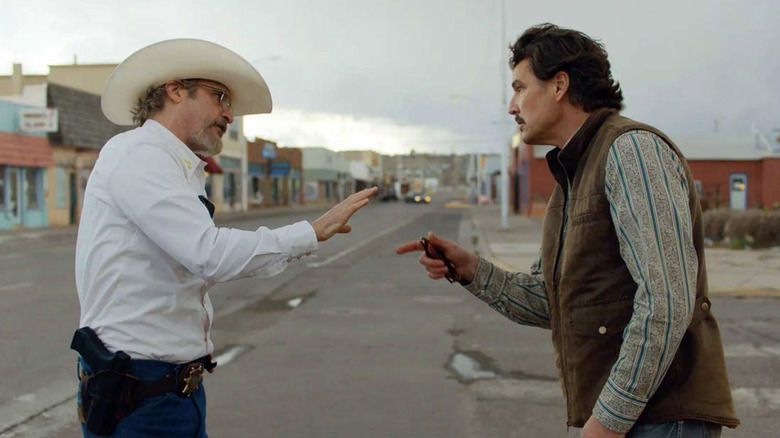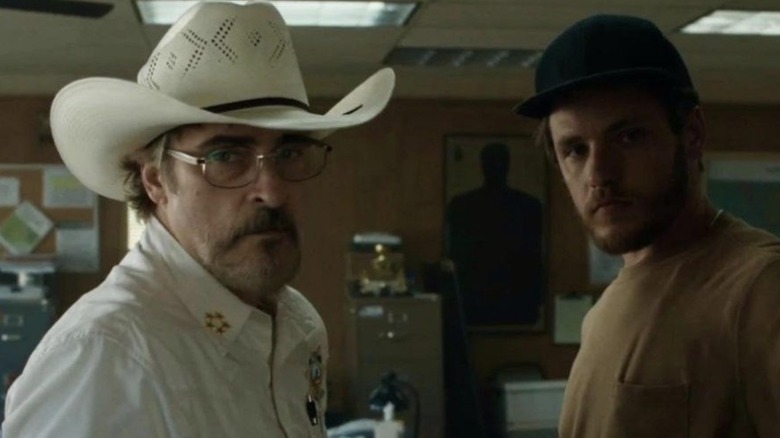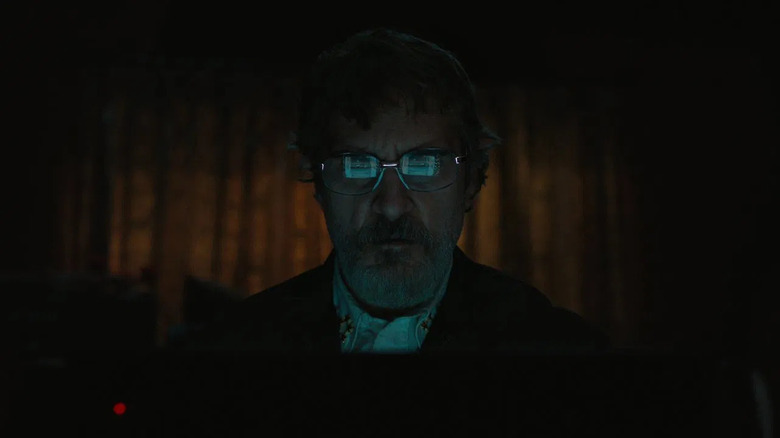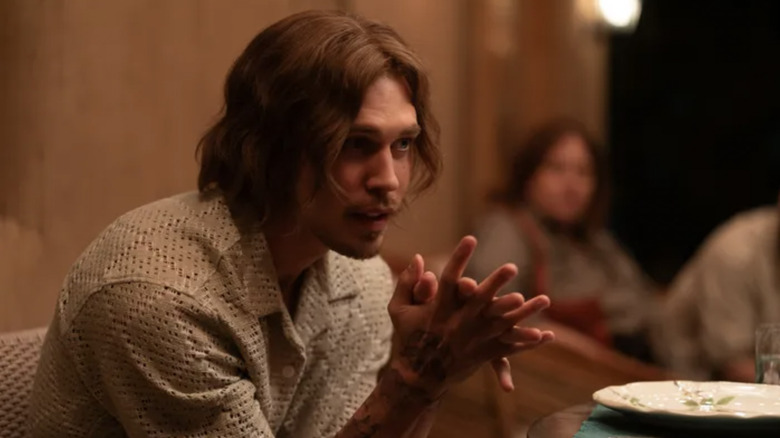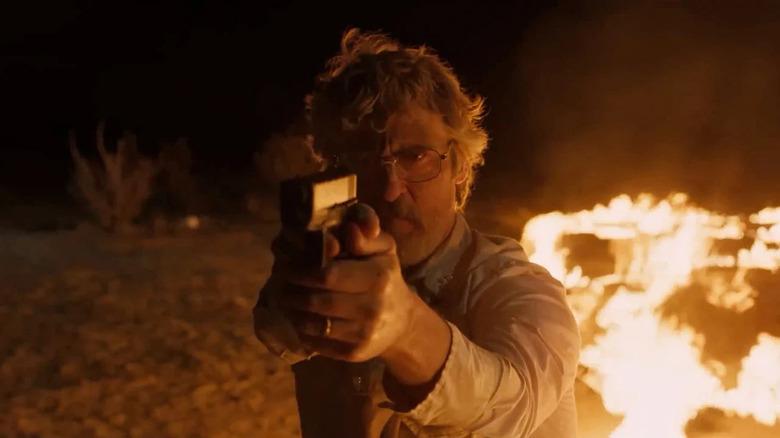Eddington Review: Ari Aster Holds Up A Mirror To American Insanity In This Twisted Western
When it comes to life's impactful events, there is a distinction between acknowledgement and understanding. The latter can only come with distance and time; no era can be fully understood while we're still living in it, no matter how long or how short it lasts. The former is much more immediate, as all it takes is a brief glance at major news headlines to grasp when something is happening. Unfortunately, acknowledgement has much more potential to lead to emotional upheavals especially because an event or problem is still ongoing. It's why the term "doomscrolling" has entered the common parlance, and why recent national issues (never mind international ones) have contributed to an overall mental health crisis that so many of us are experiencing these days. It's not paranoia if the news seems like it's really out to get you, in other words.
America's current descent into cultural madness has many contributors, of course; this is not the sole problem of just one tragic incident or one person. Yet it does have a crux point in the year 2020, wherein the combination of a worldwide pandemic, the institution of lockdown and social distancing practices, the increasing injustices perpetrated by the government and more turned everyday life into a bizarre, hellish existence for several months at least. Even though things seemingly began to improve in 2021, the truth is that none of us have ever fully recovered from 2020, least of all our country, as recent events have more than demonstrated. We're through the looking glass, and although our daily existence may or may not be hellish, it's very few people's definition of "normal."
Filmmaker Ari Aster has never made a so-called "normal" film during his short but prolific career. In fact, his work has been growing increasingly abnormal, as his journey from "Hereditary" through "Midsommar" to "Beau is Afraid" shows. With this month's "Eddington," a demented take on the Western thriller set during the height of the troubles of 2020, Aster has made his most twisted movie yet: a normal one. That's not to say "Eddington" doesn't bear Aster's signature stylistic tics, but instead says a lot about our real life: things have gotten so strange that we've already been living inside an Ari Aster movie, and all Aster had to do was point and shoot it.
Eddington throws together the Western, the noir, and the thriller in a satiric stew
The biggest mistake to make when approaching "Eddington" is the same type of mistake Aster might've made when conceiving it, which is to view it as some biopic-esque encapsulation of the events of 2020. "Eddington" is not "All the President's Men," "United 93,"or "Don't Look Up," but is instead much closer to "Bulworth" and "Burn After Reading" by way of something like "Bad Day at Black Rock." It's May of 2020 in Eddington, New Mexico, and the small town's conservative Sheriff, Joe Cross (Joaquin Phoenix), thinks he's being a straight shooter Everyman when arguing against wearing a mask in public. Despite his right wing leanings, Joe initially seems to be the type of authority figure America used to revere: the no-nonsense and friendly type, someone always looking to de-escalate as much as possible while remaining stern in his principles.
Yet all is not well with Joe, nor is it well with a town he assumed would be forever secluded in a bubble from the rest of the country. Joe has a longstanding beef with the mayor, Ted Garcia (Pedro Pascal), over an incident which may or may not have happened in the past involving Ted and Joe's wife, Louise (Emma Stone). Louise's mental health is in jeopardy thanks to her conspiracy-crazed mother, Dawn (Deirdre O'Connell), staying with her and Joe due to lockdown reasons, causing Louise to become further entangled with a local guru, Vernon Jefferson Peak (Austin Butler), whose motivational speeches are becoming increasingly cult-like. Joe, incensed with current events and especially with Ted, decides to launch a campaign to run for mayor himself, for which he enlists the help of his hapless deputies Guy (Luke Grimes) and Michael (Michael Ward). In the middle of all this, the Black Lives Matter movement makes its way to Eddington, sparking some clashes between the authorities and the protestors, which in turn draws the attention of some mysterious outside interests and causes Joe to make some highly questionable choices.
In a lot of ways, "Eddington" feels like a cumulative film for Aster's work so far. While the plot has many characters and a lot of moving parts a la "Beau is Afraid," the movie has the single-minded structure of "Hereditary" and "Midsommar," films in which the characters are essentially doomed from the beginning, even though they don't realize it. This makes "Eddington" feel as accomplished as it does, with Aster and cinematographer Darius Khondji keeping the film visually on an even keel for as long as possible, thereby making the transition to anxious paranoia seem much more gradual than in Aster's horror features.
Eddington plays with political fire
The mistake to think of "Eddington" as a polemic or partisan political statement is one that is mostly the responsibility of the audience. Yet Aster isn't entirely off the hook, either, as his film quite deliberately plays with political discourse fire. Like I said earlier, a majority of the issues that America was dealing with in 2020 have simply not gone away in 2025, as much as some might want them to or even believe them to be (COVID-19 is still an active virus, folks). As such, Aster quite rightfully does not purport to definitively solve any of the problems that "Eddington" raises, yet them being raised at all borders on irresponsibility.
"Borders" is the operative word there, because had Aster opted to exclusively use metaphorical examples for the film — a different virus than COVID-19, a different movement than BLM, etc — then "Eddington" would lose so much of its bite, as well as its purpose. If the movie had been made by a lesser filmmaker, or even by someone whose work was generally less complex, then the way "Eddington" refuses to "both sides" its issues as well as not necessarily pick any side would result in a hugely offensive mess. Undoubtedly, people will lob this accusation at "Eddington" anyway, and some reviews out of the film's Cannes premiere already have. Yet there's no question that "Eddington" fits into Aster's oeuvre as neatly as any of his films, as such moral murkiness can be seen in each one of them. The big difference here is that this messy morality isn't just relatable, but is something that each and every one of us have dealt with and, most likely, still are. Whether audiences are ready and willing to acknowledge this, or would rather point fingers at Aster for bringing up the increasingly unavoidable elephant in the room, will be up to them.
Joaquin Phoenix and Ari Aster prove themselves to be a dynamic duo
While none of the political and moral issues "Eddington" raises can be satisfyingly resolved, that's not to say that "Eddington" is an overall frustrating film. The movie is, perversely, often a delight, and much of that can be chalked up to how Aster and Phoenix have combined forces to become a director/actor duo on the level of Martin Scorsese and Leonardo DiCaprio, or Yorgos Lanthimos and Stone. Phoenix always delivers an intense and layered performance, but his work as Joe here is something to behold. Oscillating between a savvy Everyman with integrity and a disreputable, meek bastard, Phoenix doesn't make the easy choice of having Joe be all facade or secretly flawed. It's a characterization that his fellow actors have a ball with, both in terms of their scenes together as well as the way they portray their own characters. Pedro Pascal, who's become a real fixture in film and television of late, delivers one of his most intriguing performances here; all one needs to do is put his turn in "Materialists" next to "Eddington" in order to demonstrate how much Pascal can deliver range with subtlety.
Speaking of range, I'd be remiss to not mention how much Aster appears to be growing and changing as a filmmaker himself here, too. While there is a jumpscare or two in the film, and one shot in particular that is perhaps one of the most anxiety-inducing shots ever seen in a motion picture, Aster uses "Eddington" to further demonstrate his own range as a director, heading down a comedic, satiric road that "Beau is Afraid" began and ending up with almost Coen Brothers levels of absurdist gold. What Aster deftly demonstrates in "Eddington" is a sense of restraint. "Beau" was Aster with the brakes torn off, a movie in which reality broke so hard that it became unrecognizable. "Eddington" does slide into insanity, no question, but its most potent choice is never letting things get out of the realm of believability.
The ambiguity of Eddington is a feature, not a bug
Many folks have a huge problem with ambiguity in art, particularly cinema, and it's mostly for this reason why "Eddington" could be a hard watch for some. The ambiguity surrounds the film's political content, as stated earlier, yet it pervades just about every other element of the movie, too, especially regarding the backstories and motivations of several characters. This is why when Aster and "Eddington" do choose to be crystal clear, as with Joe and his actions, it feels even more gloriously uncomfortable than it might otherwise. This ethos extends as far as the film's ending, which is another aspect that sees Aster evolving as a filmmaker — where Aster's prior endings have been very explicit in their finality, "Eddington" doesn't even allow for that form of release, and instead has us wallow in further uncertainty.
All of this can make "Eddington" an unsatisfying experience on first viewing, of course. Yet it's a film that never feels neutered or held back, and as such it lingers in the mind for days afterward. Although "Eddington" is a close sibling to them, the film is not a nihilistic fable like Richard Kelly's "Southland Tales," nor is it a thinly-veiled commentary on the times like Robert Altman's "Nashville." Despite using genre elements, Aster isn't hiding behind them. "Eddington" is a raw nerve, a naked depiction of the state America has gotten itself into, and it's not so egotistical as to suggest either an ending or a way out. It's a film of almost pure acknowledgment, and while it's going to take more than a single movie, perhaps it's a step toward understanding where we are, who we are, and what can be done about it.
/Film Rating: 8 out of 10
"Eddington" opens in theaters on July 18, 2025.
